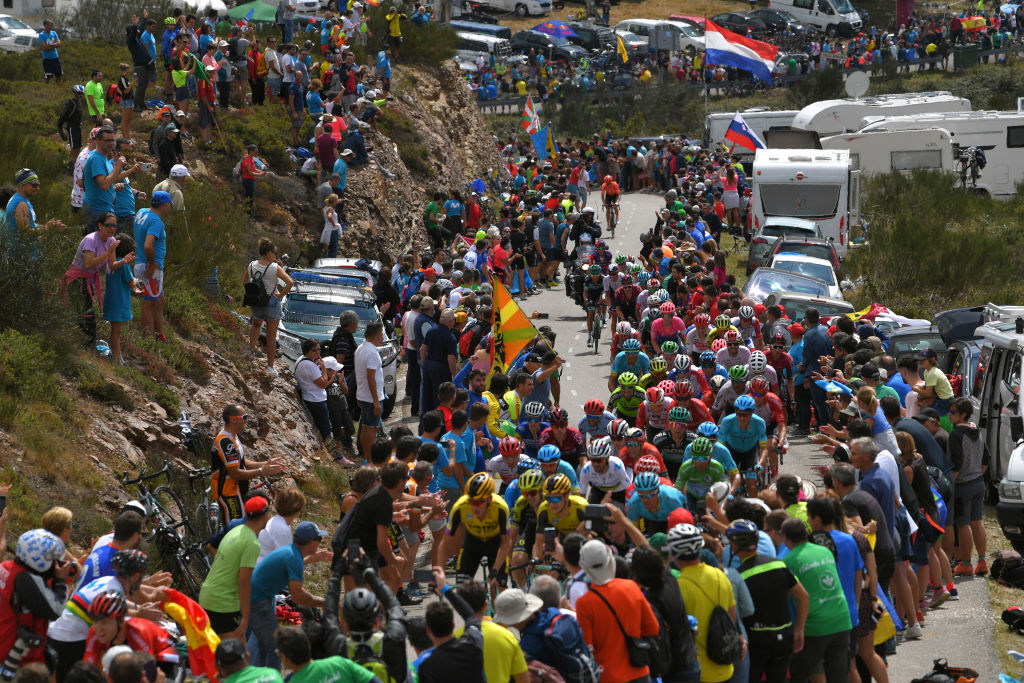Road-side spectators give resounding thumbs-up to 2019 Vuelta a España
Major independent survey of race’s social impact finds positive result

A major independent survey of the social impact of the 2019 Vuelta a España has found that – quite apart from appreciating seeing the race live – a hefty majority of roadside spectators believed that the Vuelta had considerable longer-term benefits for the towns and cities through which the race passed.
The survey of the 2019 Vuelta a España, carried out by researchers from the University of Murcia in south-east Spain and published online on Tuesday morning, interviewed thousands of spectators at starts, finishes and towns on ten stages on the race route.
Of the 4,585 local residents interviewed, 93 percent of all fans felt the greatest benefit of all was the strengthening of the town’s national profile and image, although almost as many – 92 percent – felt that their towns benefited from concrete financial investments made by the public authorities thanks to the race’s arrival.
One example of this would be – although this does not form part of the report and is something of an urban myth in Spain – about how roads used by the Vuelta a España in a particular municipality often mysteriously benefit from roads being resurfaced a few days before the race arrives.
Around 90.7 per cent also thought that the race’s passage through their area would encourage tourism to the locality and 90.3 per cent believed it would have positive repercussions in local businesses.
Contradicting the widespread belief that the most enthusiastic cycling spectators tend to be older people, the survey found the greatest degree of popular backing for La Vuelta was among the under-25 age group.
It could be argued that spectators prepared to turn up on the road-side to watch a bike race are unlikely to think it is not worth their while. But the University of Murcia researchers tried to allow for that by testing spectators’ reactions both before, during and after the race had passed – to see if their interest and support for the event had lessened once it was over.
Get The Leadout Newsletter
The latest race content, interviews, features, reviews and expert buying guides, direct to your inbox!
They found that in particular, fears of a possible environmental impact of the Vuelta diminished once the race had passed through a town and spectators had seen its real effect.
Furthermore, local commerce in stage towns and cities reported a 36.7 per cent increase in trade, and 94.6 per cent of businesses said they wanted the Vuelta to return.
Of the 1041 tourists (non-residents) who had travelled to see the Vuelta who did the interview, the average outlay per person on their Vuelta visit was only around 37 euros. However around 90 per cent said they would return to that town in particular – when presumably they would spend more money – and 97.4 per cent said they would return to the Vuelta, regardless of where it was held.
Interestingly, while it’s traditionally believed that most tourists visiting the Tour de France are not French, in the Vuelta at least, around 80 per cent of non-residents watching the race were Spanish, travelling an average distance of 151 kilometres to get to the race. Almost all were in groups of between three to four people. Like the residents, a large proportion of the tourist spectators did some kind of sport for at least five hours a week and the highest percentage, 35 per cent, were cyclists.
The researchers argued that Vuelta a España enjoyed greater local social support than the – comparatively few – recent major studies had shown of other Grand Tours, most notably a 2007 investigation into roadside spectators of the Tour de France. Globally, the figures for 2019 Vuelta also offered an improvement on a single stage worth of research carried out by the investigators into the 2018 race.
Another interesting piece of data was that while half of all road-side spectators said they followed La Vuelta on television when not at the race, a significant proportion - a quarter - did so mainly or exclusively via the Internet.
🔴 LIVE | Presentación del informe de impacto social y turístico de #LaVuelta19👨🏻💻 @FerriJMiguel @jmlopezgullon @umucafd @Ingesport_Um @UMU y Javier Guillén🇬🇧 Presentation of the social and touristic impact report of #LaVuelta19 https://t.co/Hw49jwz0kF https://t.co/gp2ePKNOrBApril 7, 2020
Alasdair Fotheringham has been reporting on cycling since 1991. He has covered every Tour de France since 1992 bar one, as well as numerous other bike races of all shapes and sizes, ranging from the Olympic Games in 2008 to the now sadly defunct Subida a Urkiola hill climb in Spain. As well as working for Cyclingnews, he has also written for The Independent, The Guardian, ProCycling, The Express and Reuters.
